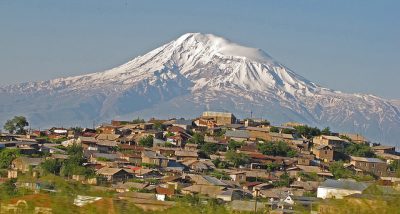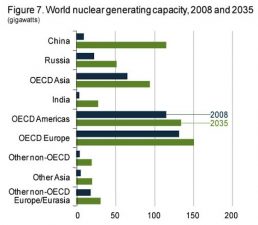 Jordan has supported a parliamentary committee recommendation to suspend Jordan’s projected nuclear programme
Jordan has supported a parliamentary committee recommendation to suspend Jordan’s projected nuclear programme
It’s certainly been a busy week for Khaled Toukan who is commissioner of the Jordan Atomic Energy Commission. First, a parliamentary committee releases a report which states that he misled the public about the feasibility of uranium mining in Jordan and that the Commission was “hiding facts” about the cost of a nuclear reactor. Then a recording alleged to be of Toukan emerges in which he calls those against the nuclear programme “donkeys and garbage men.” Following these two events, a protest was held calling for his resignation and MPs are now supporting a parliamentary recommendation to suspend the programme citing the hazardous consequences of nuclear.
Although there has been a steady campaign against Jordan’s nuclear power ambitions since early 2011 (which we have covered extensively), things have taken a rather dramatic turn in the last week or so. A parliamentary report issued last week raised questions about the openness and transparency of the Jordan Atomic Energy Commission (JAEC) which is leading Jordan’s nuclear plans.
In the Jordan Times, it was reported that in its answer to the parliamentary panel, the JAEC said that a 1,000-megawatt nuclear reactor will cost $5 billion. But the nuclear agency provided no information on the costs of other aspects of the project, such as the water cooling, the electricity to operate the project, nuclear waste storage and plant decommissioning.
In a hearing in January, MP Mahmoud Kharabsheh (Balqa, 1st District) claimed that the additional costs will raise the total price tag of the project to JD20 billion – a figure Toukan disputed. “What the report is referring to is the cost of a desalination plant and an electricity grid upgrade, which are unrelated to the nuclear programme,” Toukan said to the Jordan Times.
Energy officials have singled out nuclear power as key to weaning the country off energy imports, which cost some 25 per cent of gross domestic product. However, protestors have insisted that more effort and investment be put into exploring safer and more sustainable forms of energy creation. This call was supported by various MPs who insisted that the “hazardous and costly” nuclear programme be suspended and replaced with environment-friendly energy-generating projects such as solar and wind power.
Despite this vote of no confidence, Toukan said the motion will not impact ongoing uranium exploration efforts and that the nuclear programme will go ahead as planned. He added that an economic feasibility study, due to be completed in August, will be the deciding factor in the uranium mine’s construction.
Jamal Gammo, head of the Lower House Energy Committee told the Jordan Times that the motion did send a clear message that Jordanians are “not convinced” with the feasibility or strategic value of the mega-project. “There are still doubts over whether this programme is in the interests of Jordan or in the interests of a few individuals or companies,” Gammo said. “This is why we need to stop and make sure we have our facts straight before we move forward.”
: Image of previous nuclear protest via Hamza Omari/ Greenpeace Jordan.
For more on Jordan’s nuclear plans see:
Understanding Jordan’s Nuclear Ambitions
Jordanians Step Up Nuclear Protests
Greenpeace Raises More Questions Over Jordan’s Nuclear Plans




The Jordanian Coalition for Nuclear Free Jordan read with great interest the interview given by His majesty King Abdullah II to AFP on 12 September 2012, which referred to Jordan’s nuclear reactor project. We hereby express our appreciation of His Majesty’s “understanding of the constructive domestic opposition to this project, particularly since it springs from concern for public safety” and we feel obliged to clarify our position regarding Jordan’s nuclear program, particularly because a few columnists have accused those who oppose the project of indirectly serving Israeli designs to hinder the nuclear project!
If Israel seeks to hinder the project, it would appear high time to stop all cooperation projects with Israel, particularly those of the Jordan Atomic Energy Commission (JAEC) such as the SESAME Synchrotron project, “Bridging the Gap” project in Wadi Araba and the meetings between the JAEC and Israeli Atomic Energy Commission. It is also worth noting that Israeli daily Haaretz and the Jerusalem Post claim that Israel assists Jordan’s nuclear energy project.
His Majesty stressed the “need to find immediate solutions to end the burden of Government subsidies,” mainly to fuel prices. In conformity with His Majesty’s instructions we remind the Government that the nuclear option will deepen the energy crisis because building a nuclear reactor takes 6-8 years in advanced industrialized countries, and more than 15 years in a developing country such as Jordan. Alternatively, the Government can reduce expenditure on fuel subsidies immediately through an energy efficiency plan and building renewable energy power plants (wind, solar power, and biofuel) which can become operational in one year, within a comprehensive program to achieve energy security in 4-5 years.
His Majesty emphasized the need to enhance Jordan’s self sufficiency in energy. We fully share this goal and recall that enriching uranium in Jordan would not be economically feasible because of the high cost and that the project will deepen Jordan’s dependence on foreign companies for importing, transporting and recycling nuclear fuel, as well as burying depleted fuel in Jordan for millions of years.
We call for an inquiry into the documents leaked from Areva SA (contracted by JAEC to extract uranium) and SRK Consulting (which reviewed the results of uranium samples). These documents reveal that the concentration of Jordanian uranium ore is so low that its extraction would not be economically feasible. This raises questions regarding the statement that “Jordan possesses 3% of the world’s uranium resources”. The documents do not credit Jordan with a tenth of this quantity. How can Jordanians rely on the extraction project when JAEC, on one hand, confirms the feasibility, and on the other hand announces that it did not yet launch a feasibility study!
His Majesty stressed that “safety should be the top priority” and that Jordan “would only select the latest and safest generation of nuclear reactors.” Therefore we call for investigating the reasons for discarding the Korean offer and exclusively considering the remaining two offers, one of which is Areva’s, which is still a design on paper that is neither built nor tested anywhere in the world, even in France itself. After His Majesty made his comments, JAEC seized the chance to commit Nuclear Regulatory Capture with a series of actions, violating the Jordanian Nuclear Law and undermining the independence of the regulator which is crucial to setting and enforcing safety and security. These actions go obviously against the global trend and lessons learned from the Japanese Fukushima tragedy.
His Majesty stated that “the cost of the proposed nuclear power plant would be JD 3.5 billion.” We therefore call on JAEC to bear responsibility for any expenses beyond this figure. JAEC has concealed a number of indirect expenses of the nuclear project, such as interest on the construction loan, the cost of protecting nuclear installations, drawing and rehearsing emergency and evacuation plans, recycling nuclear fuel abroad, returning depleted fuel and burying it in Jordan and preparing the infrastructure needed to receive reactor parts, as well as the cost of rehabilitating the site after decommissioning the reactors. Even more importantly, JEAC admitted before the Parliamentary Commission of Inquiry that the cost of one reactor would reach $ 7.5 – 8 billion, and that Jordan would need to build at least two reactors at a cost of $15 – 16 billion. Later we were shocked by a JAEC statement in a TV interview on 7 Stars (22 September 2012) that Jordan needs to build three reactors at a 1,100 megawatt capacity each.
The global trend today is for energy security utilizing renewable energy, which requires developing a legislative framework as well as financial, technical and human resources. Jordan needs to embark on a national project that involves Jordanian expertise and national resources including oil shale and gas. We look to His Majesty King Abdullah II to lead Jordan in an ambitious national program for renewable energy that would generate not less than 50% of Jordan’s electricity needs from renewable energy by 2020.
Finally, we call on the Government of Jordan to comply with Jordanian law and to respect the vote of the 16th Assembly (64-vote majority) to stop the nuclear program immediately until studies on the economic feasibility and environmental impact of the project are completed. We thus ask: “Why JAEC provided the Parliament and the government with misleading information? Why has the Jordan Atomic Energy Commission not complied with the Parliamentary ruling till now?”
Jordanian Coalition for Nuclear Free Jordan